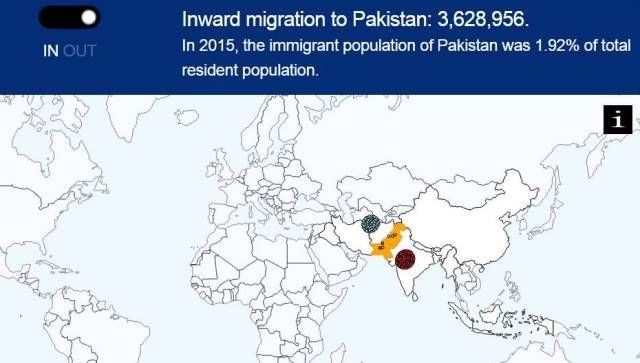 Inward migration to Pakistan: 3,628,956. In 2015, the immigrant population of Pakistan was 1.92% of total resident population [IOM interactive map]
Inward migration to Pakistan: 3,628,956. In 2015, the immigrant population of Pakistan was 1.92% of total resident population [IOM interactive map]
To many people slavery might seem long consigned to the history books but the unprecedented surge in the flow of migrants to Europe since 2015 has revived human-trafficking routes across the Sahara desert from west Africa to the shores of the Mediterranean once used by slavers. The issue is one of critical relevance to the Commonwealth as the two largest nationalities for migrants landing in Italy after crossing by sea from Libya are member states: Nigeria and, strikingly, Bangladesh, the Financial Times reported.
According to International Organization for Migration figures, 181,000 refugees arrived in Italy in 2016, half of the total of 363,000 arrivals in Europe via the Mediterranean Sea and a rise of 44% on 2016. That number is forecast to top 200,000 this year. Nigeria represents the largest single nationality of migrants arriving in Italy – as it did last year – followed by Bangladesh, Guinea, Cote d’Ivoire and the Gambia.
An Observer article laid bare the brutality of the modern African slave trade, which is openly conducted through ‘slave markets’ in Libya. It describes forced labour, routine rape of the women and girls trafficked for the sex trade, and migrants detained for ransom and beaten in private prisons until their families pay. If no ransom is forthcoming, men are taken away and killed, to be replaced by new captives acquired in the markets, the Guardian reported. The IOM also found that many migrants had been offered cash in exchange for giving blood, organs or body parts. Often blood is taken unwillingly from captive migrants.
Commonwealth offenders
But while the trans-Mediterranean route has come under the spotlight recently, the worst offenders are also Commonwealth members: Pakistan, Bangladesh and India are three of the top-five countries listed by the Global Slavery Index as having the most slaves relative to population – of the estimated 46 million slaves around the world, 58% are in these three countries, along with China and Uzbekistan. More than one in every 100 of India’s and Pakistan’s populations is a slave – a staggering 18,350,000 in India and 2,135,000 in Pakistan.
It is probably no coincidence that such high prevalence of slavery is in countries that suffer from domestic and regional instability and the dispersal of populations, whether displaced internally or abroad as refugees and asylum seekers. Pakistan, for example, hosts more than 1.6 million refugees, more than any other country in the world after Turkey, according to the United Nations High Commissioner for Refugees (PDF). Other Commonwealth states that host large numbers of refugees include Kenya and Uganda, which have nearly a million between them.
While some Commonwealth states – including Canada, Australia and New Zealand – are among those with proportionately the lowest levels of slavery and others, such as Britain through the 2015 Modern Slavery Act, are leading the way in clamping down on traffickers, it is a cause for concern that so little is being done elsewhere.
As the Commonwealth secretary-general, Patricia Scotland, noted last year, only a quarter of member states have signed up to the UN Convention on the Protection of Migrant Workers. It is surely time to make this a bigger priority for the Commonwealth – but those of us in the developed world who indirectly benefit from the cheap labour provided by these men and women must also look around us more closely.
Oren Gruenbaum is the Editor of Commonwealth Update.
Related articles



